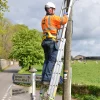MLL Telecom Wants More ISP Competition for UK Public Broadband Funding
Business ISP MLL Telecom has called on the government to improve its controversial Broadband Delivery UK (BDUK) process, which has been delayed by European competition concerns, by opening up access to public funding (State Aid) for more providers.
At present the BDUK Framework remains highly restrictive and only allows bids for Local Broadband Plans(LBP) to come from BT or Fujitsu UK, although the latter appears to have given up on the process and similarly fell out of favour with the government a couple of months back.
Advertisement
The resultant lack of competition, which has left BT as the only viable choice for most local authorities, eventually forced the European Commission (EC) to halt funding approvals for a significant number of related projects. Progress is now understood to have been made and a decision is expected shortly, although so far nobody except the government knows what to actually expect.
David Pinnington, MLLs Head of Government & Systems Integrators, said:
“At the moment there are only two companies that are eligible to carry out the work on super-fast broadband under the BDUK framework – BT and Fujitsu. The government needs to consider opening up the framework to more companies that can help deliver connectivity quicker and to consider delivering contracts in smaller lots to encourage competition, especially to those areas that currently have the poorest coverage.
Regional councils should be encouraged to introduce their own competition to accelerate the process and not feel they have to strictly adhere to the BDUK commercial procurement framework.”
Pinnington suggests that the delays mean “it is unlikely that targets will be met in the timeframe set” (i.e. 90% of UK people to have superfast broadband by spring 2015) and hints that the general public could be left waiting until at least 2017 or “possibly even longer“.
But this remark fails to consider that the original timetable never accounted for BT being able to bring its commercial deployment of superfast broadband services forward by 18 months (set to reach 66% of UK premises by spring 2014).
Pinnington added:
“The problem lies in the way the targets have been set in the first place. At the moment, operators are rolling out fibre optic technology in big cities first to provide super-fast internet connections. Instead though, the government should be encouraging operators to focus their efforts on the 15 percent that can’t even get minimum speeds [2Mbps] in order to really make a difference.
By concentrating on these neglected areas first they would gain maximum benefit from the funding available early on in the project and use it to its best advantage – a much fairer system overall. The current delays should push the government and the regional councils to rethink their priorities and strategy.”
It’s worth pointing out that the figure of around 15%, which references those unable to get speeds of 2Mbps or more, has according to Ofcom’s latest report, now shrunk to just 10%. However this figure is based on broadband speeds in a best case scenario, which rarely reflects reality when the actual figure is probably still somewhat higher.
Advertisement
We share in MLL’s hope that the EC’s recommendations could result in more ISPs (altnets) being given fair access to public funding, although many councils might still prefer the easy option of picking BT. On top of that most local authorities have already entered the procurement process and this means that any change to allow more competition is perhaps more likely to affect a post-2015 strategy.
Mark is a professional technology writer, IT consultant and computer engineer from Dorset (England), he also founded ISPreview in 1999 and enjoys analysing the latest telecoms and broadband developments. Find me on X (Twitter), Mastodon, Facebook, BlueSky, Threads.net and Linkedin.
« KC Resolve Broadband Speed and Connectivity Woes for Customers in Hull

















































Comments are closed